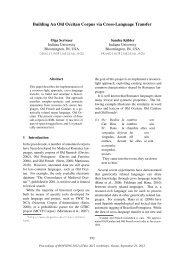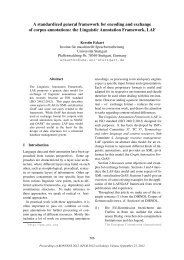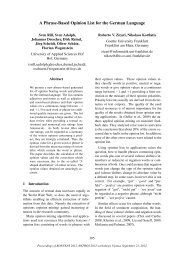Proceedings - Österreichische Gesellschaft für Artificial Intelligence
Proceedings - Österreichische Gesellschaft für Artificial Intelligence
Proceedings - Österreichische Gesellschaft für Artificial Intelligence
Create successful ePaper yourself
Turn your PDF publications into a flip-book with our unique Google optimized e-Paper software.
graphic word boundaries and considering multiple<br />
source tokens at one time (Reynaert, 2011). An effective<br />
way of doing separate matching as needed<br />
in the case of vill-honnugh remains a question for<br />
future work.<br />
4 Conclusions<br />
We are working towards automatic annotation of<br />
about 3 million words of historical Swedish texts.<br />
As a first step, we are developing a module to handle<br />
spelling variation. Three sets of approximate<br />
matching rules were used, one with hand-crafted<br />
substitutions, and two with substitutions automatically<br />
extracted from alternative entries in a lexicon.<br />
We presented a pilot evaluation by matching words<br />
in two short texts to our historical lexica. While<br />
the automatically created rules find more matches,<br />
the manual rules have higher precision. Future<br />
work includes improving the anagram hash filter,<br />
incorporating Old Swedish morphology, handling<br />
multi-word units, and exploiting context information<br />
to improve precision.<br />
Acknowledgements<br />
The research presented here is carried out in the<br />
context of the Centre for Language Technology<br />
of the University of Gothenburg and Chalmers<br />
University of Technology.<br />
References<br />
Marcel Bollmann, Florian Petran, and Stefanie Dipper.<br />
2011. Rule-based normalization of historical<br />
texts. In <strong>Proceedings</strong> of the RANLP Workshop on<br />
Language Technologies for Digital Humanities and<br />
Cultural Heritage, pages 34–42. Hissar, Bulgaria.<br />
Lars Borin and Markus Forsberg. 2008. Something<br />
old, something new: A computational morphological<br />
description of Old Swedish. In <strong>Proceedings</strong> of the<br />
LREC 2008 Workshop on Language Technology for<br />
Cultural Heritage Data (LaTeCH 2008), pages 9–16,<br />
Marrakech, Marocco. ELRA.<br />
Lars Borin, Markus Forsberg, and Lennart Lönngren.<br />
2008. The hunting of the BLARK - SALDO, a freely<br />
available lexical database for Swedish language technology.<br />
In Nivre, Dahllöf, and Megyesi, editors, Resourceful<br />
language technology. Festschrift in honor<br />
of Anna Sågvall Hein, volume 7 of Studia Linguistica<br />
Upsaliensia, pages 21–32. Uppsala University,<br />
Department of Linguistics and Philology, Uppsala,<br />
Sweden.<br />
Lars Borin, Markus Forsberg, and Dimitrios Kokkinakis.<br />
2010. Diabase: Towards a diachronic<br />
BLARK in support of historical studies. In Calzolari,<br />
Choukri, Maegaard, Mariani, Odijk, Piperidis, Rosner,<br />
and Tapias, editors, <strong>Proceedings</strong> of the LREC<br />
2010 workshop on Semantic relations. Theory and<br />
Applications, Valletta, Malta. ELRA.<br />
Lars Borin, Markus Forsberg, and Johan Roxendal.<br />
2012. Korp – the corpus infrastructure of språkbanken.<br />
In Calzolari, Choukri, Declerck, Doğan,<br />
Maegaard, Mariani, Odijk, and Piperidis, editors,<br />
<strong>Proceedings</strong> of the Eight International Conference<br />
on Language Resources and Evaluation (LREC’12),<br />
Istanbul, Turkey. ELRA.<br />
Anders Fredrik Dalin. 1853/1855. Ordbok öfver svenska<br />
språket, volume I–II. Stockholm, Sweden.<br />
Bryan Jurish. 2010a. Comparing canonicalizations<br />
of historical German text. In <strong>Proceedings</strong> of the<br />
11th Meeting of the ACL Special Interest Group on<br />
Computational Morphology and Phonology, pages<br />
72–77, Uppsala, Sweden. Association for Computational<br />
Linguistics.<br />
Bryan Jurish. 2010b. More than Words: Using Token<br />
Context to Improve Canonicalization of Historical<br />
German. Journal for Language Technology and<br />
Computational Linguistics, 25(1):23–40.<br />
Eva Pettersson, Beáta Megyesi, and Joakim Nivre.<br />
2012. Parsing the past - identification of verb constructions<br />
in historical text. In <strong>Proceedings</strong> of the<br />
6th EACL Workshop on Language Technology for<br />
Cultural Heritage, Social Sciences, and Humanities.,<br />
Avignon, France.<br />
Martin Reynaert. 2011. Character confusion versus<br />
focus word-based correction of spelling and<br />
OCR variants in corpora. International Journal on<br />
Document Analysis and Recognition, 14:173–187.<br />
10.1007/s10032-010-0133-5.<br />
Carl Johan Schlyter. 1887. Ordbok till Samlingen<br />
af Sweriges Gamla Lagar, volume 13 of Saml. af<br />
Sweriges Gamla Lagar. Lund, Sweden.<br />
Knut Fredrik Söderwall. 1884/1953. Ordbok Öfver<br />
svenska medeltids-språket. Ordbok Öfver svenska<br />
medeltids-språket. Supplement. Lund, Sweden.<br />
Martijn Wieling, Jelena Prokić, and John Nerbonne.<br />
2009. Evaluating the pairwise string alignment of<br />
pronunciations. In Borin and Lendvai, editors, Language<br />
Technology and Resources for Cultural Heritage,<br />
Social Sciences, Humanities, and Education<br />
(LaTeCH - SHELT&R 2009) Workshop at the 12th<br />
Meeting of the EACL, pages 26–34.<br />
Amber Wilcox-O’Hearn, Graeme Hirst, and Alexander<br />
Budanitsky. 2008. Real-word spelling correction<br />
with trigrams: A reconsideration of the mays, damerau,<br />
and mercer model. In Gelbukh, editor, Computational<br />
Linguistics and Intelligent Text Processing,<br />
volume 4919 of LNCS, pages 605–616. Springer.<br />
369<br />
<strong>Proceedings</strong> of KONVENS 2012 (LThist 2012 workshop), Vienna, September 21, 2012





